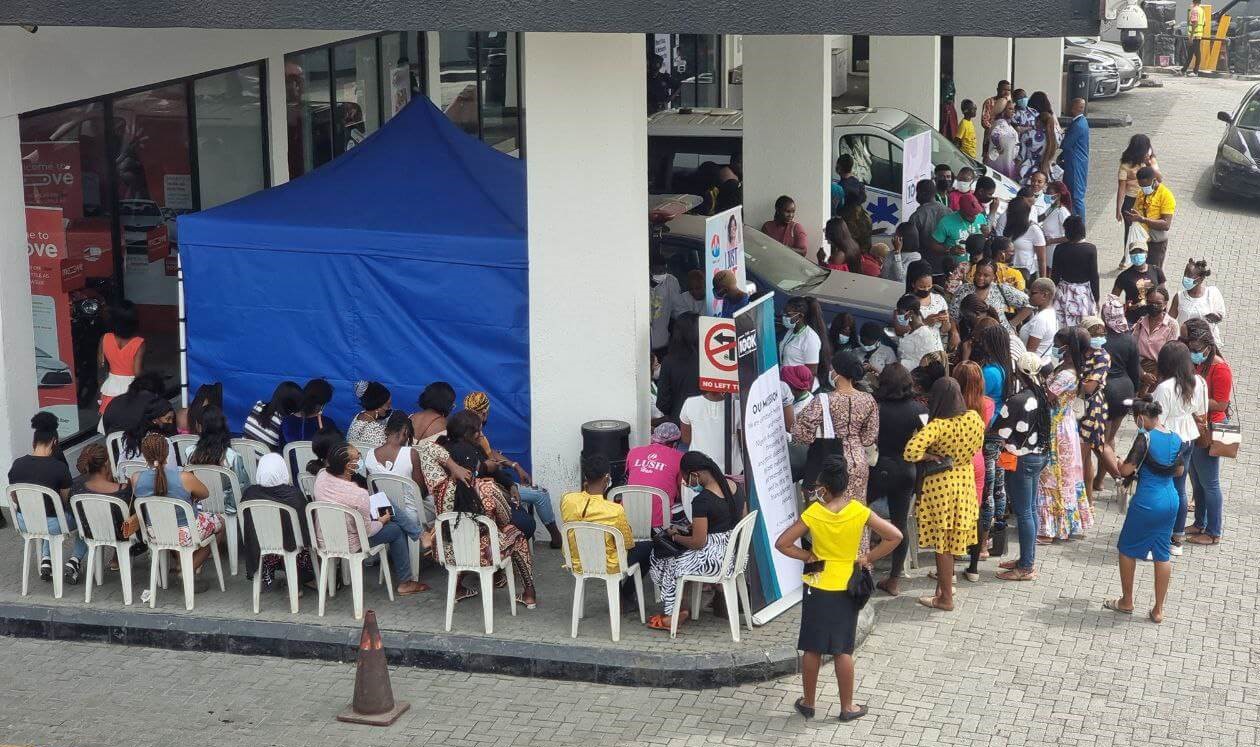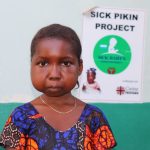OTA, OGUN: Opeoluwa Lawal, 41, lost a friend to breast cancer in early January this year, while another friend was in a critical stage battling the disease.
Terrified by these experiences, having earlier stumbled on a tweet promoting free breast and cervical cancer screening in Lagos, soon, she was travelling 25 miles from Ota, where she lives in Ogun State, to Surulere, Lagos, to get screened.
“I felt it was high time I checked myself too,” she said.
Breast cancer is the leading cause of cancer-related deaths globally among women, accounting for 685,000 or 6.85% of the 10 million cancer cases in 2020, according to data from the World Health Organisation or WHO.
In Africa, the WHO says breast cancer is the most common of all cancers, with 129,000 cases recorded in 2020 alone. Unfortunately, one in every two cancer cases in Africa results in death.
Nigeria is Africa’s highest cancer burden bearer, recording 14, 274 deaths or 2.1% of the 685,000 global breast cancer-related deaths in 2020.
High poverty rate, low awareness levels, lack of screening, and poor geographical access to cancer care are reasons for high cancer-related mortalities here.
Daniel Emmanuel, a medical doctor at the General Hospital in Koton Karfe, Kogi State, told Prime Progress that it costs between N7000 and N14000 to have a breast cancer screening in a private health centre or a public healthcare facility in Nigeria.
Lawal did not have to pay between N14,000 and N28,000 to be screened for breast and cervical cancer (another common cancer among women) in Lagos. A medical outreach group called Quinta Health was offering the screening free of charge. The only cost she incurred was her transportation fare of N1000 to Lagos and another N1000 back to Ogun.
Creating a solution
During his compulsory National Youth Service in Enugu State between 2016 and 2017, Babatunde Enoch Adewumi, a medical doctor, was a volunteer medic with a multi-sectoral nonprofit, Ugo’s Touch of Lives Foundation.
The organisation trained him to conduct breast and cervical cancer screenings, an interest he had nursed ever since he witnessed his close friend lose her mother in 2011 to cervical cancer.
In June 2018, a year after completing his national service, Adewumi founded Quinta Health, focusing on female sexual and reproductive health, including early detection of breast and cervical cancers.
The social enterprise uses a three-phase approach to help low-income community women: pre-outreach, outreach and post-outreach stages.
In the pre-outreach stage, “We sort out our partnership with the organisation we are working with [to fund a community outreach]. It could be an NGO, a private entity or the state government. They [partners] take care of the logistics of our work. This way, the women do not have to pay for the screening,” Adewumi, a medical doctor at the Federal Medical Centre, Abeokuta, explained, listing Ugo’s Touch of Life Foundation, Amen Healthcare Foundation, and The 100k Club among organisations that have partnered with Quinta Health.
After securing funding, a Quinta Health team visits a selected rural community working with community leaders to create awareness about the proposed one-day outreach, usually at a strategic outdoor location in the community. Awareness creation would involve storming public places like markets to persuade women to attend the screening.
On the outreach day – the second phase, “We set up our screening tents [fitted with mobile beds to hold one woman at a time] and begin seeing the women,” Adewumi said.
“If we find precancerous lesions [signs of cervical cancer] in any woman, we carry out cryotherapy treatment (the use of excessive cold to harden and take out abnormal tissue).”
For breast cancer screening: “we do clinical exams and use handheld infrared scanners too. If we find anything we cannot attend to right there, we make referrals,” he said.
He said the post-outreach stage is “where we compile a report for our partners and do a follow-up on women who need it.”
In Lagos, Lawal was happy when her screening result showed negative for both cancers.
“The moment the doctor put the [infrared] light under [my] breast, it became so transparent, and I could see everything for myself,” she said. “If there were a lump, I wouldn’t need anybody to tell me. In the end, all my tests were okay. I will go for the cervical cancer screening again after three years and then the breast cancer screening next year.”
According to Adewumi, Quinta Health’s team of six volunteer medics reaches nearly 100 women during each outreach. It has screened 6700 women through 100 outreaches in communities in Kwara, Lagos, Gombe, Enugu, Imo, Oyo, Ekiti and Benue states, and Abuja, including 400 women treated for cervical cancer.
Occasionally, Quinta Health trains doctors and nurses in community health centres on how to conduct the screenings. It has trained 50 health workers, establishing 13 screening centres in Gombe and Enugu since 2017.
Vaccination
Quinta Health subscribes to the WHO’s 90-70-90 cervical cancer elimination strategy, which says 90% of girls should be fully vaccinated by the age of 15; 70% of women should be screened, and 90% of women with pre-cancer should be treated, while 90% of those with invasive cancer should be properly managed.
Thus, Quinta Health partners with the vaccine-accredited distributor, VacciPharm, to vaccinate women against cervical cancer during its outreaches.
But Adewumi complained that since the outbreak of COVID-19, Quinta Health had had challenges accessing the vaccines.
“Even more pressing is the scarcity of HPV vaccines. Cervical cancer is caused by the human papillomavirus (HPV). With vaccination, it is preventable. But for over a year, the vaccines have not been available in Nigeria, especially those produced by GSK [GlaxoSmithKline]. So, the impact of our work has been limited,” he said.
Fadeke Adeyemi, general manager at VacciPharm Limited, an accredited distributor of GSK vaccine in Nigeria and Quinta Health’s partner for vaccinating the women, explained more clearly to Prime Progress why the vaccine is scarce.
“The vaccines used to be easily accessible, but the COVID-19 disruption has affected supply chains,” she said. And with countries like Australia adding cervical cancer vaccinations to their national immunisation schedules, there has been a global shortfall since 2021 as manufacturers prioritise developed countries with high demand over developing ones like Nigeria.
What can we learn from Australia?
Australia is on the verge of eliminating cervical cancer by 2028, with projections of only four cases per 100,000 women. The journey to this feat began in 1991 when the country started its National Cervical Cancer Screening Programme and later introduced a national HPV vaccination programme for girls in 2007. As of now, Australia records as few as seven cervical cancer cases per 100,000 women.
Like Australia, “HPV vaccinations should be part of routine vaccinations for girls from the age of nine [through a national policy] in Nigeria,” Adewumi suggested. “This way, [Nigeria’s] demand for the vaccine will increase and make it more available to Nigerian women.”
Meanwhile, if Lawal, a small-scale poultry farmer, did not have a free screening option, she probably would not have taken the step to get screened.
“The fact that it was free encouraged me to go for it. If it were not, I probably wouldn’t have gone. I have never really asked for the price, but I always assume it is expensive. I am happy that I have done it, and I will recommend it to every woman because it is better to know one’s status once and for all,” she said.
This story was produced with the support of Nigeria Health Watch through the Solutions Journalism Network, a nonprofit organisation dedicated to rigorous and compelling reporting about responses to social problems.






